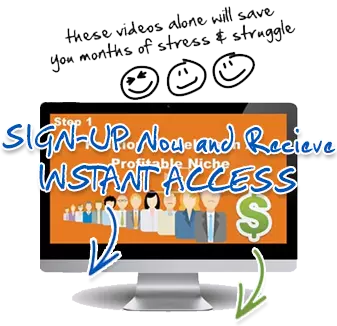I think you’d agree that whether you’re selling a product or inviting someone to join your business, closing is the most critical phase in a sales presentation. Yet so much of closing depends on what happened before you got there.
You must have done your probing right. You must have presented the product or opportunity correctly. You must have also built up a rapport between you and the prospect. All of these are essential to reaching that final step, the close!
When you reach the closing phase, the most important thing to remember is this: you must BELIEVE you can close it! The secret to guaranteeing the close is to make your prospect see the product or service through your eyes. They must feel that you’re 100% confident that what you’re selling can really help and benefit them.
So let’s say that you’ve done all of the above and finished the actual presentation. The prospect hasn’t exactly jumped up and screamed, “Yes!” with excitement to purchasing your product or partnering with you. Here’s what you can do to get them to a successful close:
1. Probe how your prospect feels. People rarely make decisions with their minds alone; they make decisions based on their emotions and how they feel. So once you’ve engaged their heads with your presentation, bring it down to their hearts. Ask them probing questions like the following:
• How did you like the presentation?
• What did you like about the product/service/business?
• Are the benefits clear to you?
• Do you feel it will help you?
• Is this the kind of thing you’re looking for?
• Are you happy with your current provider/product/business?
2. Answer any questions/objections. You can lead this off with, “Based on what you saw, is there anything you can possibly think of that would stop you from buying/starting now?”
Never be afraid of objections; it’s a sign that your prospect is thinking about what you presented. It’s scarier when they don’t have any objections at all—they either didn’t understand you or haven’t paid any attention at all!
The following are typical objections:
a. Too expensive – if you did your probing right and you know this person can afford your service, it may be that the prospect hasn’t seen the value of your proposal. Try and see what they mean by “expensive,” and work from there. Remind them of the particular problem during your probing session and let them see how your solution can help. If it can help cut their costs, emphasize that.
b. No time – remember that people will always have enough time if they’d only see the value in something, and they believe that it can benefit them in some way, shape or form. Therefore, prove the value of what you have to offer.
If you’re inviting the prospect to join your network, ask them what is taking up the majority of their time (job, work, etc.). Ask them also if they have enough time for themselves and their family. Then finally, ask them if they’d be willing to try your solution if it will allow them to have more time for themselves in the long run.
c. I need more information – Ask them what more they need to come up with a decision “TODAY”, then work from there. You’ll probably end up with one of the other objections.
d. I will ask my wife/husband/parents/siblings/partner – One approach is to present to both of them. You can say, “Great! Can I ask you something? Who’s the decision-maker, you or your spouse? (wait for the answer). Then I suggest that you tell your spouse that I’m inviting the both of you to meet with me so that he/she will see the presentation the way you saw it.”
3. Point out how the product/service/opportunity is a solution to their problem. This is a test on how well you did your initial probing in the first phase of your presentation. You must first have a clear understanding of the prospect’s problem before you can position your product as the solution.
If the prospect is having trouble deciding, highlight how the product or service solves or minimizes their troubles, helps them earn extra income, or helps them reach their goals faster. Answering objections is dealing with the negative, but in this step you must emphasize the positive.
4. Ask for the sale. It’s hard to believe that many skip this one crucial step. Unless they’ve said yes ahead of you, ask your prospect to buy! Who knows, they might even be waiting for you to ask.
There are several ways to do this:
• For products: Are you ready to buy this today? If they aren’t prepared to buy right away then extend this second question: When will you be prepared to make your purchase? (always extend the offer to buy “NOW” first!)
• For network marketing: Would you like to get started with your business “TODAY”? If they aren’t prepared to start right away, tell them that they can move forward with filling out the application and post date it for the date that they are ready to start, getting them to give you the check or put the credit card number on the application that will guarantee their start date.
Or you can ask additional questions like:
• When would you like your products delivered?
• Would you prefer to pay by cash, credit card or check?
These are simple and direct ways to close any sale. You needn’t pressure or manipulate your prospect. All you are doing is calmly and courteously leading them to an informed decision.
Finally, remember the perfect end result of a closed sale: both of you and your prospect walk away smiling!
Check out my Law Of Attraction Blog at: http://attractionmarketingbiz.com






